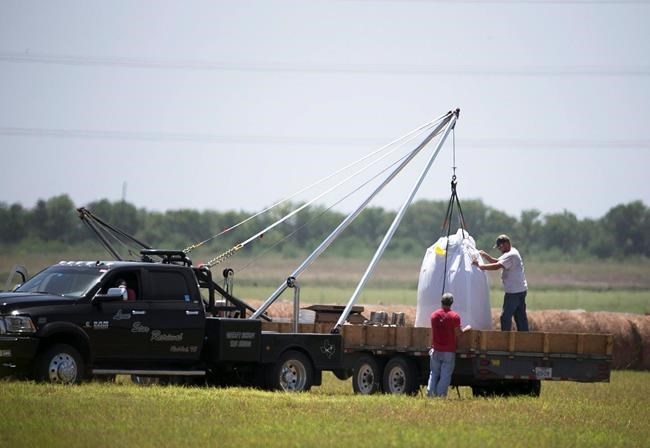
A crew hoists a bag holding the remains of a hot air balloon that crashed Saturday onto a waiting truck at the scene near Lockhart, Texas, Monday, Aug. 1, 2016. Sixteen people were killed in the incident. In the wake of hot air balloon crash in the U.S. that killed 16 people, the federal agency that oversees transportation safety in this country says there hasn't been enough action taken over safety concerns. THE CANADIAN PRESS/AP, Austin American-Statesman, Deborah Cannon
August 07, 2016 - 9:30 AM
MONTREAL - In the wake of hot air balloon crash in the U.S. that killed 16 people, the federal agency that oversees transportation safety in this country says there hasn't been enough action taken over safety concerns.
"Balloon operators can operate commercially, can take fare-paying passengers up for sightseeing tours and yet they're not required to undergo the same level of regulatory oversight that airplanes or helicopters would be doing the same activity," Transportation Safety Board chair Kathy Fox told The Canadian Press.
To carry paying customers, balloon operators must obtain a Transport Canada-issued Special Flights Operations Certificate, which Fox says can be obtained by submitting only basic information. It also never expires.
Unlike other plane or helicopter companies, balloon operations are not subject to audits or inspections and are not required to maintain operations or maintenance control manuals, Fox says.
Following the deadly July 30 balloon crash in a field in central Texas, there have been calls for stricter rules in the U.S.
A member of the U.S. National Transportation Safety Board, Robert Sumwalt, told The Associated Press there was what he called a "disparity" in the requirements for balloon operators compared to plane or helicopter pilots — similar to concerns raised by the TSB since 2008.
But the agency says recommendations for tougher commercial ballooning rules in Canada have been brushed aside by the Federal Transportation Department.
Although individual pilots must be licensed and balloons must obtain a yearly "airworthiness certificate," Fox maintains there is not enough overall industry oversight to ensure companies are operating safely.
"It's really left up to the balloon operators now, and I'm sure they're doing their best to operate safely, but the point is it's left up to them with no regulatory oversight from Transport Canada," Fox said.
The Transportation Safety Board first recommended imposing stricter regulations following a pair of 2007 accidents.
On Aug. 11 of that year, a hot air balloon with 12 people aboard caught fire after propane fuel began leaking during a rough landing outside Winnipeg. Seven people were injured — three seriously — in the ensuing fire and explosion.
Two weeks later, two people died after an intense, propane-fuelled fire broke out in a balloon preparing for takeoff in Surrey, B.C., which broke free from its tether and later plunged to the ground.
The Transportation Safety Board's report found the balloon's burners had been modified to allow it to carry a weight exceeding the recommended maximum. That's something Fox said might have come to light with more regular inspections.
In response to the board's call for tighter regulations, Transport Canada agreed to conduct a risk assessment and formed a working group to study the issue.
The assessment was not released publicly, but the federal department stated in late 2013 that the favourable safety record of operators indicated that no further regulatory action was needed to ensure passenger safety.
A spokesperson for Transport Canada said there are no current plans to revise the rules since the level of risk for balloon passengers is low.
"Transport Canada analysis shows that hot air balloon passengers and operators enjoy a safe environment," Annie Joannette said in an email.
The federal department said that between 1977 and 2012, there were five fatalities out of an estimated 26,000 balloon passengers carried annually, or 0.54 per 100,000 passengers — a rate consistent with other air operations.
Many Canadians will take to the skies in the coming weeks with hot air balloon festivals scheduled across the country, including two of the country's biggest in St-Jean-sur-Richelieu and Gatineau, Que.
Long-time balloon pilot Serge Guillette says operators have rigorous safety procedures to follow.
These include complying with Transport Canada regulations on flight crew licensing and training, registration, and maintenance and operating procedures, including passenger safety briefings and visual inspections.
What happened in Texas might have people asking questions, "but they're quickly reassured when they see the team, see the structure, when they see the support team," said Guillette of Quebec-based balloon company La Magie de l'air.
He said most operations in Canada are smaller and less commercial than their U.S. counterparts, run by experienced pilots who are motivated by a love of being up in the air.
"In general, our operators are all very passionate, they're not people who are going to take risks, and when the conditions aren't optimal, we don't fly and that's it," he said.
News from © The Canadian Press, 2016